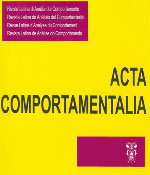Recombinative reading after fading in procedure of the syllables of teaching words in people with cognitive developmental deficits
Main Article Content
Abstract
The main objective of the present study was investigate if a fading in procedure consisting in gradual increasing of the letters of syllables in teaching reading could favor recombinative reading. Two participants with deficits on the cognitive development were submitted to teach of relations between dictated words and printed words (AC) and soon after, to the equivalence tests between figures and printed words (BC) and printed words and figures (CB). After these tests, the participants were exposed to reading tests, first with the teaching words and after with generalization words. It was used syllabic control probes that verified restricted control by partial units. After these probes, one of the participants was first submitted to combined teaching of copy, dictation and oralization highlighting syllables that had not acquired controlling of reading responses in the anterior phases, and after that to the same combined procedure using fading in of the same syllables, increasing the size of its letters. Another participant was submitted only to the fading in procedure. Both participants presented recombinative reading after fading in. The results suggested that gradual increasing of the size of syllables during copy, dictation and oralization teaching favor control by all of the units of the words producing recombinative reading in people with cognitive developmental deficits.
Article Details
How to Cite
Sales Alves, K. R., Alves de Assis, G. J., Misae Kato, O., & de Faria Brino, A. L. (2011). Recombinative reading after fading in procedure of the syllables of teaching words in people with cognitive developmental deficits. Acta Comportamentalia, 19(2). Retrieved from https://journals.unam.mx/index.php/acom/article/view/28026

<a rel="license" href="http://creativecommons.org/licenses/by-nc-sa/4.0/"><img alt="Licencia de Creative Commons" style="border-width:0" src="https://i.creativecommons.org/l/by-nc-sa/4.0/88x31.png" /></a><br />Este obra está bajo una <a rel="license" href="http://creativecommons.org/licenses/by-nc-sa/4.0/">licencia de Creative Commons Reconocimiento-NoComercial-CompartirIgual 4.0 Internacional</a>.
